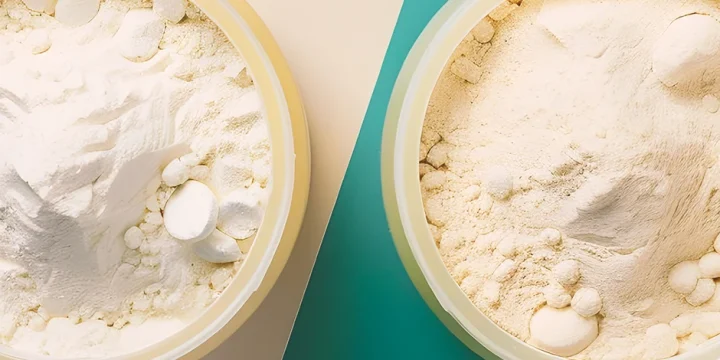As a fitness trainer with more than a decade of experience in the industry, I've seen creatine work for me. That's why I don't shy to recommend it to my clients who want to build muscle size and strength.
However, one question I always get is "How long does it take before results start to show?"
The answer is not always straightforward as it depends on several factors.
So, to understand the factors and the process, I've compiled what I know about creatine, did additional research, and consulted a nutritionist.
Here's what you need to know.
Quick Summary
- Scientifically, creatine takes roughly two weeks to one month for it to work and for some results to be visible. However, individual variations can influence this timeline significantly.
- To increase the effectiveness of creatine, go for the highest quality creatine, eat a healthy diet, and engage in high-intensity workouts.
- Consistency in workouts while taking creatine is the best way of getting the best out of this supplement.
- Having witnessed countless success stories, I believe creatine is a game-changer for anyone serious about maximizing their muscle growth and overall fitness.
How Long Does It Take for Creatine to Work?
It can take one to two weeks or a month for creatine to work. Creatine stores in your muscles must rise to the degree of muscle saturation before you can experience the effects of creatine supplementation.
It’s different for everyone and depends on various factors, as explained below, including the supplementation type, quality, purity, ways of taking it, workouts you do, etc.
4 Key Factors Affecting How Long it Takes

The following key factors determine whether you’ll start noticing the benefits of creatine supplementation in a couple of days, weeks, months, or never.
1. The Type of Creatine You Take
Since the invention of pre-workouts and the subsequent boom in the supplement industry, the market has been flooded with different types of creatine. However, most of them are ineffective.
I've personally experimented with different types of creatine supplements during my early training days. However, after trying powdered creatine, no other type has matched its speed and effectiveness.
Some supplement companies claim that creatine HCL, creatine ethyl ester, liquid, or other forms are superior to powdered creatine monohydrate and better absorbed, but studies have shown that that’s not true [1] [2] [3].
My nutritionist claims that such products often contain creatinine instead of creatine. The former is a compound made when your body breaks down creatine. It doesn’t enhance your high-intensity exercise performance at all.
Related Article: What is Buffered Creatine?
2. It's Quality and Purity
From my long experience using different powdered creatine supplements, it's not enough to choose the right type, you need to choose a quality one for that matter. This further ensures purity and safety.
Carefully check the label for the following information:
- The product has been tested for impurities before or after packaging, and the findings are displayed.
- It’s made in the USA, ensuring top quality control (no lead or other harmful ingredients or impurities).
- Choose an extra-fine micronized powder so that it easily dissolves without sticking to your glass.
3. How You’re Taking It
I've always found it more effective to take my creatine supplement with fruit juice. My nutritionist says that foods that raise your insulin maximize creatine's availability in your muscles. Apparently, insulin plays a crucial role in nutrient uptake.
People following Keto or any other low-carb diet can take it with a post-workout protein shake for similar effects.
Also, research shows that timing isn’t so critical. Personally, I've used it before, during, and after a workout and it worked just fine both times.
There are two safe and tested methods of taking creatine supplements:
- Creatine loading - take 20 grams of creatine daily in 2-4 servings for 5-7 days; then, take a maintenance dose of 5 grams daily in a single serving to keep your muscles filled up - preferred when athletes want to maximize their greater muscle mass stores to see results fast (typically within a few days).
- A single serving per day - take lower doses of 3-5 grams of creatine every day - instead of 3-5 days, this method takes at least 2-4 weeks to get noticeable muscle growth, strength, and other results.
Luckily, any method you choose will provide results, regardless of creatine levels, the body's creatine stores, and maintenance dose habits.
However, the way you take creatine supplementation directly influences how fast you’ll see the results of a specific product [4].
4. The Type of Workouts
This one is a bit obvious; Individuals who work out harder, pushing their muscles to the limit are more likely to experience the creatine supplementation benefits faster. I can personally attest to this from my experience and that of working with different clients.
In addition, resistance training routines combined with creatine supplementation can help you increase muscle strength, gain muscle mass, and notice other positive effects faster than if you participate in endurance activities such as long-distance running [5].
That’s because creatine supplements provide a source of instant energy increase and power output required for resistance training, strength training, and other high-intensity activities for muscle growth.
How Creatine Boosts Muscle Growth
Creatine boosts muscle growth by influencing specific hormone pathways to enhance muscle size and boost energy levels.
In addition, creatine also reduces levels of myostatin, a protein that can inhibit muscle growth. Lowering myostatin levels promotes increased muscle strength and growth [6].
How to Take Creatine Most Effectively

From my experience and consultation with my nutritionist, the most effective way of taking creatine is the creatine-loading method.
This entails ingesting 20 grams of creatine daily for 5–7 days to rapidly saturate your muscles, then 2–10 grams daily to sustain high levels.
Although you cannot expect to experience significant changes in your body composition, muscle-building, training volume, quality improvements, creatine levels, or any other effect instantaneously, following the steps below can help you see results faster.
Use High-Quality Creatine Supplementation
We’ve already learned that not all creatine supplements are created equal.
“If you’re going to add a supplement in, make sure it’s creatine monohydrate. A lot of other supplements out there will have a lot of junk that you don’t need, and they’ll be much more expensive.”
- Carolyn Brown, Registered Dietitian
If you don’t want to throw your hard-earned money away, make sure you stick to 100% pure creatine monohydrate powder. Many experts, including my nutritionist assert that this is the most researched, effective, and affordable way with a lower risk of side effects than any other available creatine form.
Pay Special Attention to Your Nutrition
Creatine supplements have a different effect on every person. Besides genetics, metabolism, exercise, etc., one critical factor determining how your lean body mass may respond to creatine is your diet.
For example, vegetarians and individuals who don’t regularly eat meat and other foods rich in creatine may notice a greater change in natural creatine production.
Also, the quality of food is critical for fueling up your high-intensity workouts and supporting your post-workout muscle recovery process.
Your body needs an adequate intake of carbs to get energy and muscle strength, plus protein replenishment to repair damaged muscle tissue.
That’s how you’ll take advantage of a high-quality creatine intake.
To speed up the whole process, here’s another expert advice:
“Save money and buy creatine powder and [mix it with] fruit juice. [...] If your diet is junk, there’s no point in adding creatine. It’s better to eat good sources of carbohydrates and lean protein.”
- Chad Kerksick, Ph.D. in Exercise Physiology, University of Oklahoma
Reason: The sugar from fruit juice or other sports beverages increases your insulin levels, helping increase creatine uptake into your muscles.
Engage in High-Intensity Activities

As much as creatine helps you build muscle, it won't help you if you're sitting on the couch all day. You need to put in the work.
Creatine influences the ATP production in your muscle cells, increasing your energy and power output during intense exercises such as weightlifting or sprinting, which results in more muscle strength and better performance.
I always recommend high-intensity exercises for my clients who are on creatine for maximum benefits.
It's worth noting that the effects of creatine can vary based on your fitness level. This means that beginners and advanced athletes experience different benefits.
Start with the Creatine Loading Phase to Boost Your Creatine Stores
Although it’s not necessary, I recommend starting with creatine loading to reach higher levels of muscle saturation and speed up the process for quicker results.
It means taking higher amounts of creatine, e.g., 20 grams per day for 7 days (as previously explained).
Follow Up with the Maintenance Phase
After creatine loading, is the maintenance phase where you take a lower maintenance dose of 5 grams daily to keep adequate creatine levels [7] and avoid depleting creatine stores in your muscle mass.
No Need for Running a Creatine Cycle
Many people stop taking creatine for a while after taking a high dosage for several months. Then, they resume creatine loading.
It's a good marketing strategy for selling more creatine, but there’s no research evidence to support the effectiveness of this process.
FAQs
How Do You Know Creatine Is Working?
You know creatine is working when you notice that your training volume and quality have increased, i.e., you can perform a few more reps or your last set gets easier to complete, especially when lifting weights.
How Much Creatine Should I Take a Day?
You should take 5 grams or 20 grams of creatine per day during the creatine-loading phase (as explained above). Taking 0.03 grams of creatine per 1 kg of your body weight is recommended.
Read more: How much creatine should I take per day?
How Long Does Creatine Stay in Your Bloodstream?
Creatine stays in your bloodstream for around one and a half hours. This could affect how much creatine you can take in the long run.
Does It Matter When You Take Creatine?
It doesn’t matter much when you take your creatine as long as you take it daily.
References:
- https://pubmed.ncbi.nlm.nih.gov/22971354/
- https://pubmed.ncbi.nlm.nih.gov/19228401/
- https://pubmed.ncbi.nlm.nih.gov/17997838/
- https://pubmed.ncbi.nlm.nih.gov/12660409/
- https://pubmed.ncbi.nlm.nih.gov/12945830/
- https://www.sciencedirect.com/science/article/pii/S2666831922000741
- https://jissn.biomedcentral.com/articles/10.1186/s12970-017-0173-z
About The Author
You May Also Like







Hi! How fast does creatine work?
Very helpful article on how long to see creatine results. Thank you, Benedict!